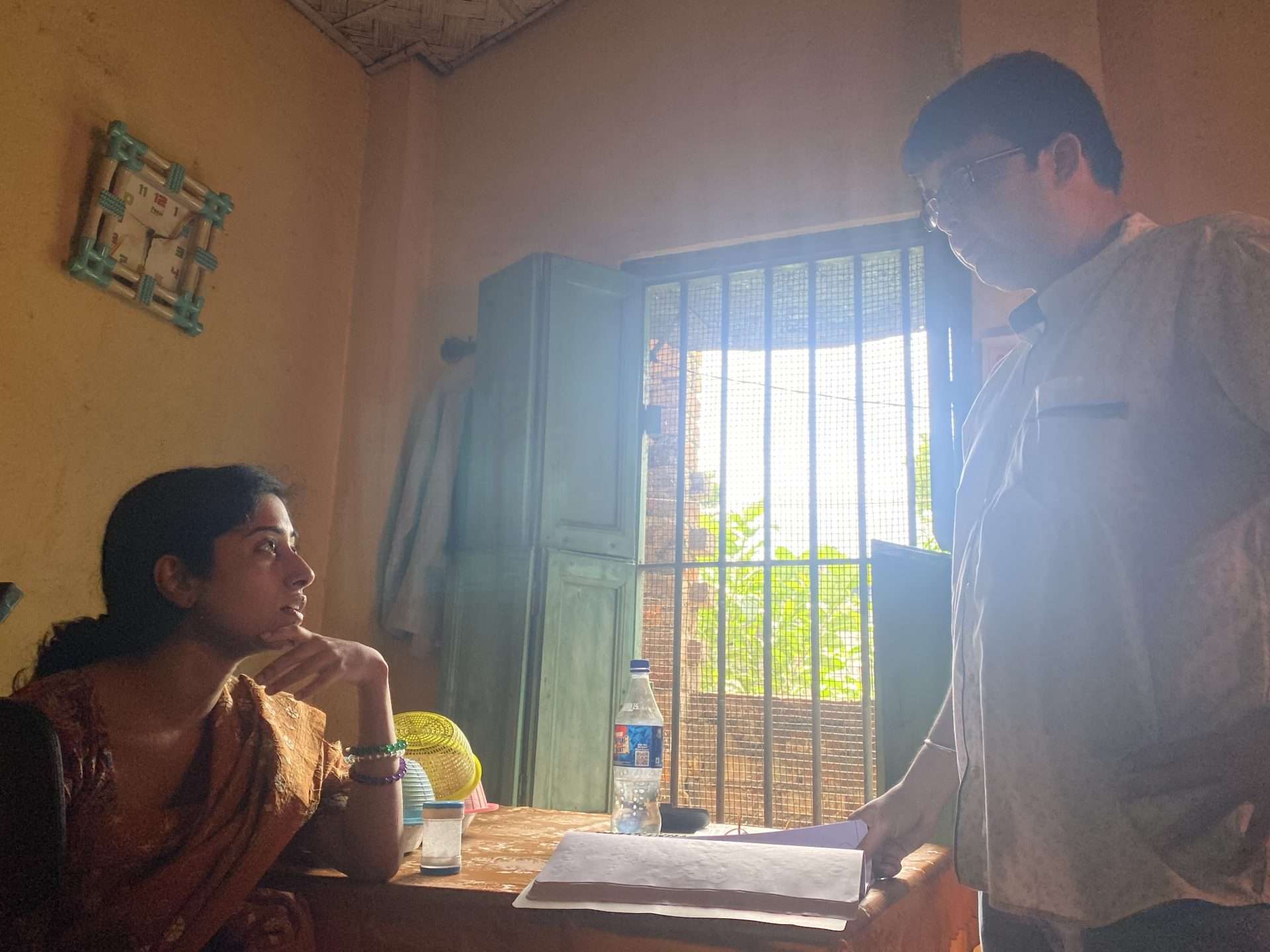“Jodi” (“If”) is Tathagata Ghosh’s sophomore short in the queer trilogy, which is expected to be completed with “Amaar Comrade” (“My Comrade”) this year. After “Miss Man” (2019), Ghosh turned towards confronting some appalling socio-political issues. Unlike “Miss Man”, which is embedded with haunting memories, trauma, and other existential questions, “Mangsho” (“The Meat”), “Dhulo” (“The Scapegoat”), and “Footprints” – films made between 2020 and 2023 – contain a linear narrative and they comment overtly on religious bigotry, class supremacy et.al societal challenges. So, in a sense, “Jodi” is Tathagata Ghosh’s homecoming, as it employs the techniques that he last used in “Miss Man.”
“Jodi” chronicles the love and loss of a lesbian couple. Jaya (Adrija Majumdar) and Fatima (Shivamrita Chakraborty) are deeply in love with each other, but their world falls apart when Jaya decides to marry a man (Bimal Giri) against her will. Stained by Fatima’s harrowing remark of being an ‘escapist’, Jaya accepts her fate, as with an ailing father at home, she fears going against the tide. On the other hand, submerged in solitude and accompanied by cigarettes, Fatima continued on her own in a territory populated mostly by Hindus until, on a stormy evening, a man who was looking for a cheap house to rent chances upon her. Upon incidentally learning that the man is none other than Jaya’s husband, Fatima vacates the house by the next morning, leaves a few traces so that Jaya knows she was there, and leaves the town.
The methods Ghosh has used in “Jodi” remind us of “Miss Man.” However, “Jodi” has a different mood. The interplay of memory that Ghosh used in this film is not as haunting as they were in “Miss Man.” In “Miss Man” Ghosh preferred to use ambient music whereas, “Jodi” has a poignant background score that articulates the feeling of ‘loss’ exquisitely. Ghosh was keen to unfold the visceral orthodoxy of our society in “Miss Man”, while “Jodi” represents the fragility of two lovers who choose to follow their destiny rather than becoming rebels to turn it upside down.
Tathagata Ghosh is one of those filmmakers who doesn’t like to beat around the bush and gets directly to the point. He does this so efficiently because, along with deftly sharpening the edges of his films’ objectives, he possesses a profound understanding of his subjects’ actual life struggles. “Jodi” is a culmination of this prolific approach. The pragmatic portraiture of Jaya and Fatima’s shattered worlds could have slipped off track if the filmmaker were ignorant of the real-life issues faced by homosexual couples. The amorous repertoire of the couple in “Jodi” has been embellished with fairy-tale-like images.

Their love affair, mostly narrated through memory, illustrates a delicate dream-like world but eludes the cliché magic-realist tropes. This is also an important juncture in Tathagata Ghosh’s career. With “Jodi” he departs from his, till now, slap-on-the-face social criticism. Also, he leaps from the burning rage and resistance of “Dhulo” and “Footprints” to embody the pre-destined kismet. Perhaps we should treat “Jodi” as Ghosh’s whispering utterance of Murphy’s law (“Anything that can go wrong will go wrong”).
Although I don’t intend to criticize Ghosh for subordinating his characters to the hand of destiny. What happens to the couple in “Jodi” is the substantive reality. Destiny is always cruel to any unorganized marginal community; it sweeps away the desires of isolated individuals belonging to that particular sect. Ghosh’s exploration of this tangible reality has made this film soft, at times melancholic, rather than buzzing with rage. Melancholia oozes from “Jodi.” Sayan Biswas, who has collaborated with Ghosh for the first time as DP, procreates some gloomy images, especially the ones used in the memory interludes, which drape the film in a plaintive blue.
“Jodi” has received accolades from critics as well as audiences at various prestigious film festivals such as Dialogues: Calcutta International LGBTQ+ Film Festival, OutReels Cincinnati, Seattle Queer Film Festival, Utah Queer Film Festival, and Oslo Fusion International Film Festival. As a film “Jodi” has solidified Tathagata Ghosh’s ground as an expert and important LGBTQ+ filmmaker. Above all, what I like most about Tathagata is his political consciousness and honesty. He has never veiled his political position and has always taken the side of the working class. In a way, “Jodi” too encompasses the struggle of the working class and doesn’t elude from critiquing religious bigotry. Ghosh has miles to go. May his adept social criticism shake the orthodox quagmire of our society.

![4L (4 Latas) Netflix Review [2019] – A derivative Road Trip](https://79468c92.delivery.rocketcdn.me/wp-content/uploads/2019/07/4-latas-movie-768x317.jpg)
![Madhuram [2021] Review: A Heartwarming Romance That Misses the Mark](https://79468c92.delivery.rocketcdn.me/wp-content/uploads/2021/12/Madhuram-Movie-Review-1-768x432.jpg)

![The Last Family [2016] – A Portrait of an Artist through Dysfunctional Family](https://79468c92.delivery.rocketcdn.me/wp-content/uploads/2017/03/cover-768x432.jpg)
![Chuskit [2019] ‘LIFF’ Review: Victory through Conflicts and Courage](https://79468c92.delivery.rocketcdn.me/wp-content/uploads/2019/06/Chuskit-2019-768x512.jpg)
